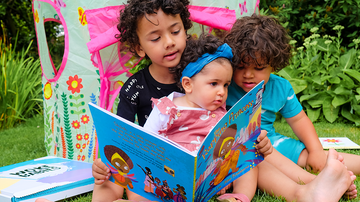Representation matters. Books, especially children’s books, have the power to shape our world by showing us different perspectives and stories. Whether it’s a black protagonist, an empowering message, or a diverse cast of characters, representation in literature can help shape the minds and hearts of young readers around the world. Let’s look at why representation matters in books and how it can empower children everywhere.

The Benefits of Representation in Books
When we think about diversity and representation in literature, many people focus on race and ethnicity. It’s true that for many readers, seeing a character who looks like them is incredibly powerful; it opens up a world of possibilities for them. Reading about someone who looks similar to themselves helps kids understand that they are not alone - that others have gone through similar struggles or had similar experiences as them. It also helps cultivate empathy when children read stories from diverse backgrounds - they learn to relate to people from various walks of life.
But representation isn't just about race and ethnicity; it's also about gender roles, disabilities, sexuality and more. When children are exposed to multiple perspectives in books, it helps them develop their own opinions and values based on what they read - helping them become more open-minded individuals later on in life. And when kids see themselves represented positively in these stories - whether as heroes or protagonists - it encourages them to dream bigger than ever before and feel empowered to take on any obstacles that come their way.
In addition to its benefits for readers, representation is also important for authors who want their work to be seen by the widest possible audience. By creating characters with diverse backgrounds and experiences, authors can reach out to new audiences from all walks of life who might not have found their work otherwise - whether through bookstores or online platforms like Amazon or Goodreads. This helps promote greater understanding between different communities as well as create opportunities for aspiring authors whose voices might otherwise go unheard.
Representation matters because it shapes how we perceive ourselves and others around us - particularly when it comes to our young readers who are still developing their sense of identity and values. Seeing diverse characters with varying backgrounds helps kids understand that there is no one right way to be; everyone has something unique to offer the world! So let's continue celebrating these stories by encouraging readers (of all ages!) around the world to pick up a book with a diverse set of characters next time they're looking for something new!




